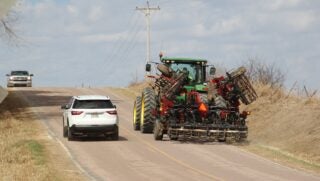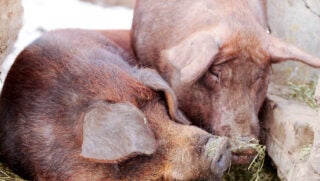Every so often you see a sign in the grocery store that can really ruffle some feathers — even beyond some of the wording on individual food labels. Here is one example that was recently seen at Kroger in Angleton, Texas:
It reads: “Beef suppliers have raised the price of products due to high consumer demand and lack of supply, driving increases in retail beef prices.”
Kroger, you should be ashamed for posting this misinformation in your meat department. Since a majority of people don’t understand the ins and outs of the food supply chain, many consumers seeing this sign are led to believe that there is a meat-production shortage on the farm level — which is absolutely not the case.
Is the supply chain screwed up due to COVID-19? Sure. As meat and dairy distribution shifts drastically from the restaurant industry to grocery stores and at-home consumption, our food supply chain “is being forced to make some substantial adjustments to a very changed world, and it will take some time to work out all the necessary modifications.” That much is clear.
But I repeat, there is not a meat shortage at the farm level. Kroger, you need to point your fingers elsewhere, if you feel the need to assign blame at all.
Being accurate here is all that much more important in an era when social media can take one little phrase and twist it completely the wrong way … and, with most people far removed from agriculture itself, it’s not too big of a leap to see how statements about our industry can be misconstrued. Consumers rarely know about the realities of ag.
If the public gets even a whiff of the possibility that there won’t be meat (or most any other staple product) available — no matter the cause — panic ensues. So folks buy up everything available and/or buy directly from farmers. (Need we remind you about toilet paper?)
Read more: As grocery shortages linger, people ask, ‘Where is our food?’
Grocery stores are taking advantage of the fact that these are hot items on the shelves, so they started charging you more $ to take advantage of the profit potential. The price of beef is higher in grocery stores than usual because … well, they can jack up the prices. Suppliers have also increased costs, the meat packers are taking advantage of their monopoly. That doesn’t make it right.
What’s far worse is the fact that farmers are seeing NONE of this profit. Grocers and suppliers are taking advantages right now, but as cattle farmers, when we sell fat cattle to the packers and processors, the cost we get paid is lower than the cost of production. If we sold live cattle today on the hoof, we get paid $1.05 per pound live weight. This means we as farmers are losing about $200 or so per head we sell.
.@USDA’s Packers and Stockyards Division will be extending our oversight to determine the causes of divergence between box and live beef prices, beginning with the Holcomb Fire in KS last summer and now with COVID-19.
— Sec. Sonny Perdue (@SecretarySonny) April 8, 2020
It‘s awful. Farming in general has not been good for the past several years, but several sectors have been even worse as of late with COVID-19. But there is no reason to take advantage of consumers while treating us as farmers like crap. It’s wrong on so many levels and something has got to change.
For those of you who buy direct from your local farmer, THANK YOU. It means more to us than you’ll ever know. I truly mean that. Buying direct from a farmer can sometimes be a make-or-break situation to keep them in the green, profitable, and in business. Because commercially we’re really getting screwed.
The good news is that more people are buying locally than ever before. The bad news is that it’s oftentimes very difficult to get an appointment with a meat locker. For example, when I make an appointment at my local butcher to get a beef or lamb processed, I can usually get that appointment within a week. Now? Can’t get an appointment until January at the earliest. This has put me out of business for the rest of the 2020 farmers market season for my direct-meat sale business.
So, places such as Kroger say there’s a meat shortage, but there’s not, at least not from the farm/supplier side. And we’re certainly not raising the price on consumers. Food system improvements need to be made, and we as farmers are currently being taken advantage of.
Michelle Miller, the Farm Babe, is an Iowa-based farmer, public speaker, and writer, who lives and works with her boyfriend on their farm, which consists of row crops, beef cattle, and sheep. She believes education is key in bridging the gap between farmers and consumers.



